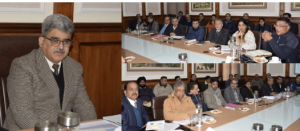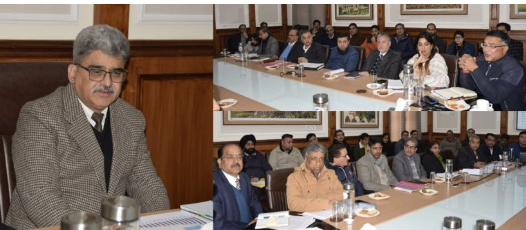JAMMU: While presiding over today’s Jal Jeevan Mission (JJM) Apex Committee meeting, Chief Secretary Atal Dulloo made a strong impression on all involved that the mission’s primary goal should be to finish the schemes on schedule following the conclusion of the tendering and task allocation process. Along with other top executives from the department, the meeting was attended by the ACS, Jal Shakti Department, Principal Secretary, Finance, Secretary, Rural Development, Secretary, School Education, Mission Director, JJM, Chief Engineer, Kashmir/Jammu, and other senior officers.The Chief Secretary emphasised in her speech at this conference the significance of determining the sustainable water source for each scheme in order to fulfil the objective of achieving “Nal se Jal” for every family throughout the year. He emphasised the importance of doing the crucial feasibility studies in order to ensure that the schemes are effective in providing their customers with high-quality water. He urged the department to assign senior officers to oversee each plan’s development and ensure that it satisfies all the requirements for the water delivery system. He even suggested designating a certain percentage of the work to be overseen by the relevant Chief Engineers, particularly for those projects involving groundwater sources or requiring electromechanical work to be finished. Dulloo also urged for strengthening the capacity of locals to carry out the testing of water delivered to them and operation of the related programmes. In order to maintain a pool of technically competent individuals in each village to oversee their projects, he advocated for as many locals as possible to receive training in the local technical institutions. He made a strong case for increasing the number of “Nal Jal Mitras” in order to improve the efficiency of the schemes and increase the testing frequency. In order for the panchayats to be approved as “Har Ghar Nal se Jal,” he also demanded that plans be made for the schemes’ upkeep and operation wherever they are required. In addition to taking the necessary steps to incorporate “water conservation” into the local school curriculum, as requested by the PM, he asked for intensifying IEC activities to raise public awareness. The group was briefed by the ACS, Jal Shakti, and Shaleen Kabra on the steps being taken to expedite the mission’s progress. He said that, as of right now, 14,23,305 families throughout the districts of Jammu and Kashmir had tap connections, accounting for 76% of all households. He said that, just in the current fiscal year, almost 3,27,215 new households had been added.In terms of work execution, the ACS found that progress is satisfactory, with 6478 (98%) of the assigned works already completed, 5806 (88%) works having commenced on the ground, and 1571 works having been finished by the executing agencies. Regarding the monitoring of water quality, it was reported that around 204957 tests had been carried out at 98 labs located throughout the state in various parts of Utah. Additionally, it was announced that 7530 Free Testing Kits (FTKs) had been delivered to villages, and over 33000 women had received training on how to correctly utilise them. It was also mentioned that, of the 22 district labs, 10 have already received NABL certification, and the remaining ones will follow suit shortly. It was claimed that in addition to boosting Pani Samities’ capacity, NGOs are brought in as ISAs and third party monitoring is implemented throughout the UT’s panchayats to guarantee quality. It was also disclosed that the Food & Drug Controller is inspecting all the water testing labs at the tehsil/subdivision level to determine their suitability and preparedness for the assigned duties. The committee then made other decisions to ensure the smooth progress of this national mission and approved in principle the implementation of 79 schemes throughout the state of Utah to include the 57837 households that were left out in various districts of the state.


